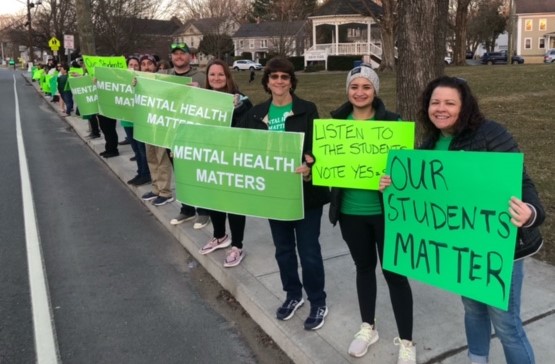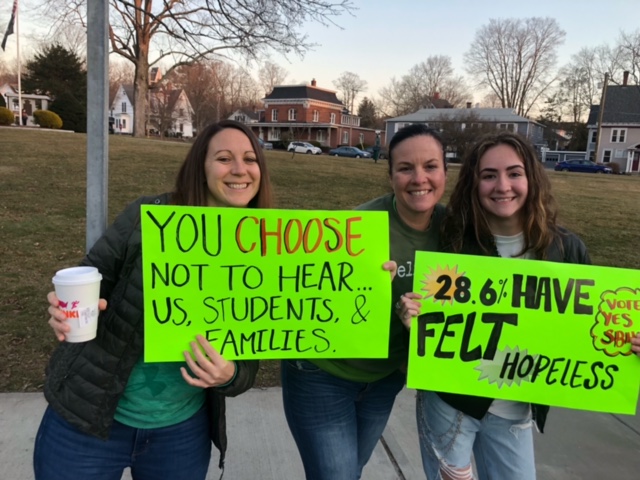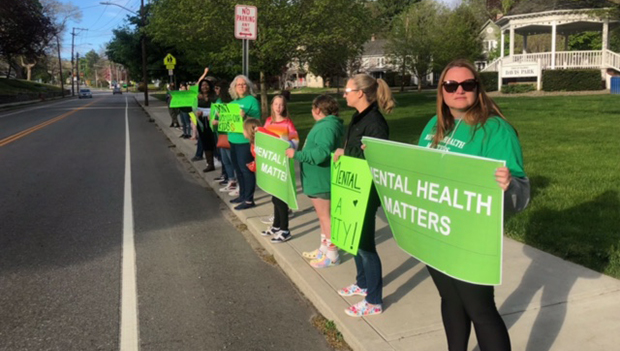It’s Wednesday and in Killingly that means teachers, students, and parents are wearing green to draw attention to the need to provide mental health supports in Killingly’s public schools. The Board of Education voted to deny students the help they need, ignoring the many cries for help, but community members are not giving up.
A survey in the fall found that nearly 15% of secondary students in Killingly had made a suicide plan and 28% had thoughts of hurting themselves. Despite these shocking statistics, the Board rejected a school-based health center that would have come at no cost to the district and been staffed by a local nonprofit, Generations School-Based Mental Health Center, providing therapy to students who often struggle to find mental health professionals in their rural community.
Speaking on behalf of the Killingly Education Association’s executive board, President Nicola Able told the Board of Education about the many students teachers see who are in crisis.
 “We see too many students fail to reach their full academic potential due to their own personal mental health concerns,” she said. “We see students who are crying or shaking from panic attacks. We see high-performing students who are crumbling under the pressure of expectations. We see students who have difficulty even coming to school. Mental health is undeniably linked to academic success. It is incredibly difficult for anyone dealing with untreated mental health issues to learn.”
“We see too many students fail to reach their full academic potential due to their own personal mental health concerns,” she said. “We see students who are crying or shaking from panic attacks. We see high-performing students who are crumbling under the pressure of expectations. We see students who have difficulty even coming to school. Mental health is undeniably linked to academic success. It is incredibly difficult for anyone dealing with untreated mental health issues to learn.”
Killingly senior Seth Varin told the CT Mirror that the Board is putting politics over students.
“I want [the health center] for the future grades,” he said. “Even if it saves one person, I feel like it would be beneficial.”
Able urged the board to help remove barriers that prevent some families from accessing mental health care for their children.
 “Even with the school-based health center at the high school, parents can still choose their own providers if they have the means to schedule and transport their child, but we do have many families who would greatly benefit from access to this level of care,” she said.
“Even with the school-based health center at the high school, parents can still choose their own providers if they have the means to schedule and transport their child, but we do have many families who would greatly benefit from access to this level of care,” she said.
“We have families without vehicles, and single-parent households where the need to bring home a paycheck and feed the family means that parent can’t take time off work to take their child to doctors’ appointments,” Able continued. “Those families deserve our support. If there is some way that we as a community can make it possible for students to get the services they need without missing school, shouldn’t we work to provide those services instead of placing further barriers?”
In an unusual move, after dozens of Killingly residents submitted a formal complaint to the state Department of Education, the state agreed to investigate the issue.
As they await the results of the state investigation, teachers, students, and parents aren’t giving up on the health center. They continue to come to rallies, wear green Mental Health Matters shirts every Wednesday, and speak up at Board of Education meetings, even when the health center is not on the agenda.
“We have an opportunity here to help more students, and we need to take advantage of this opportunity,” Able says. “Students who require and have access to mental health counseling are much more likely to perform in a classroom instead of shutting down, skipping class, or dropping out.”







